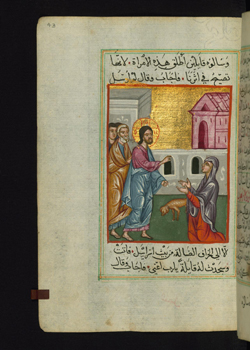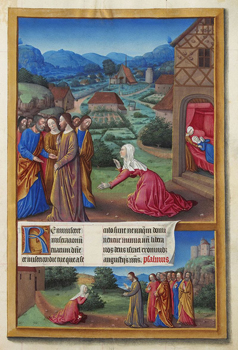For Sunday August 20, 2017
Lectionary Readings (Revised Common Lectionary, Year A)
Genesis 45:1–15 or Isaiah 56:1, 6–8
Psalm 133 or Psalm 67
Romans 11:1–2a, 29–32
Matthew 15:10–20, 21–28
Driving home from church last week, I encountered a woman at a stoplight who was asking for help. There she was — standing in the heat of the day and all the exhaust fumes with her cardboard sign, at the busiest intersection in the county. I rolled down my window. Her appeal was an almost verbatim quote from the gospel for this week: "Sir, have mercy, please help my child at home."
And there I was — sitting in my air-conditioned Prius, living in one of the wealthiest zip codes in the world, straight out of church, and feeling a little like the disciples for this week: "Send her away!" I knew I had about 10 seconds before the light turned green. And I knew that I had exactly $11 in my wallet—a ten and a one.
I gave her the ten, and felt a tiny bit better about myself.
By many different measures, this woman was living on the margins of American society — economics, housing, employment, food, and education. At about this same time, I had also read a book about American partisan politics called Deeply Divided, one sentence of which kept ringing in my ears: "the country is now more starkly divided in political terms than at any time since the end of Reconstruction and more unequal in material terms than roughly a century ago and greater, even, than on the eve of the Great Depression."
Four of the six readings this week remind us that the Christian story is fundamentally about divine inclusion conquering human exclusions. About bringing people in to the fullness of God's shalom, rather than shutting them out in a zero sum game. In particular, the readings show how this is true in two areas that people love to hate — sexuality and nationality.
Ancient Israel excluded eunuchs from its community as "blemished" people: "No one who has been emasculated by crushing or cutting may enter the assembly of the Lord" (Deut. 23:1). People with "damaged testicles" (Levit. 21:20) were only one of many groups of people who were stigmatized as disfigured and defective, and so excluded by the community.
 |
|
Jesus and the Canaanite woman, illuminated Arabic manuscript, copied in Egypt by Ilyās Bāsim Khūrī Bazzī Rāhib, a Coptic monk, 1684 CE.
|
Whether by birth or by castration, eunuchs could not reproduce. They were biologically inferior and therefore liturgically excluded. Eunuchs were deformed and incomplete human beings. Castrating your enemy was a way to humiliate him even after death (1 Samuel 18:27). Eunuchs were at best "safe" and harmless people who could serve in a king's court.
Isaiah 56 describes how God reverses this exclusion: "Let not any eunuch complain, 'I am only a dry tree.' To the eunuchs who keep my Sabbaths, who choose what pleases me and hold fast to my covenant — to them I will give within my temple and its walls a memorial and a name that will not be cut off."
The play on words is shocking: your genitals might be cut off from your body, but your name will not be cut off from God. Instead of being rejected from the temple, eunuchs will be remembered in the temple.
Jesus goes beyond eunuchs who were "born that way or made that way by men." He honors those who've made themselves eunuchs for the kingdom of God (Matthew 19:12). The brilliant scholar Origen (185–254) is perhaps the best example in the early church of taking Matthew 19:12 literally. And in Acts 8 Luke portrays the Ethiopian eunuch as a paradigm of vibrant faith rather than of liturgical exclusion.
So, that which was a source of humiliation and exclusion, a sexual "deformity," has in God's economy become a sign of divine acceptance.
Psalm 67 does for nationality what Isaiah does for sexuality; it expands the boundaries of God's embrace to include people who were vilified as enemies and outsiders.
I'm always amazed at how some of the psalms move beyond the parochial to the global. The ancient poet comes from a geo-politically insignificant tribe, yet he prays for God's blessings to fall on "all nations." God is not a territorial god, he says; he's the lord of all nations and all peoples. He welcomes "all the ends of the earth" to offer praise and thanks.
 |
|
Jesus exorcising the Canaanite woman's daughter, from the French illuminated manuscript Très Riches Heures du Duc de Berry, 15th century.
|
Jesus reinforces this point in this week's gospel. It's a mother-daughter story (and a few pages later in Matthew 17 there's a father-son story). The Canaanite woman knew that, as a Gentile, in the eyes of the Jews she was a despised "dog." She contrasts herself with the "children" of Israel. Nevertheless, she wouldn't accept the very curious silence of Jesus, the priority of his mission to Jews first, or the harsh exclusion of his disciples.
And so, she earned praise as a paradigm of great faith (Matthew 15:28) — just like many other women in the gospels: the untouchable woman with an "issue of blood" for twelve years who touched Jesus in faith, the widow of Nain, the woman bent over double for eighteen years, the widow of Zarephath, the Queen of the South, the widow who persisted in prayer, the poor but generous widow, the woman about to be stoned, the Samaritan woman at the well, and the woman who anointed Jesus for his burial.
It's a short step from the categories of sexuality and nationality to economics, politics, gender, and socio-economic class. "In Christ," writes Paul, "there is neither Jew nor Greek, slave nor free, male nor female, for you are all one in Christ Jesus."
Christians are thus radical egalitarians when it comes to the inclusive love of God. We are all equidistant from the heart of God.
In the epistle for this week, Paul levels the playing field. He says that we're all in the same boat. "God has bound all people over to disobedience so that he might have mercy on them all" (11:32).
Image credits: (1) Wikipedia.org and (2) Wikipedia.org.





